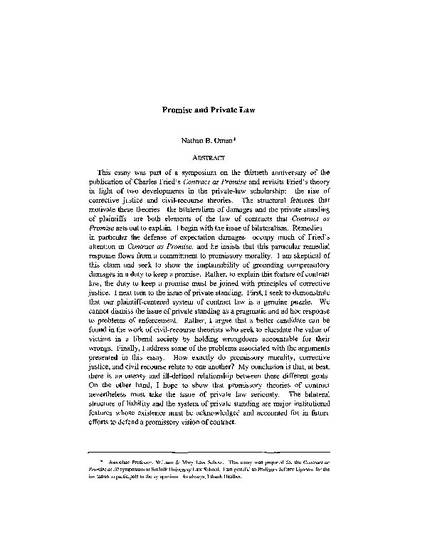
This essay was part of a symposium on the thirtieth anniversary of the publication of Charles Fried's Contract as Promise and revisits Fried's theory in light of two developments in the private-law scholarship: the rise of corrective justice and civil-recourse theories. The structural features that motivate these theories-the bilateralism of damages and the private standing of plaintiffs-are both elements of the law of contracts that Contract as Promise sets out to explain. I begin with the issue of bilateralism. Remedies--in particular the defense of expectation damages--occupy much of Fried's attention in Contract as Promise, and he insists that this particular remedial response flows from a commitment to promissory morality. I am skeptical of this claim and seek to show the implausibility of grounding compensatory damages in a duty to keep a promise. Rather, to explain this feature of contract law, the duty to keep a promise must be joined with principles of corrective justice. I next turn to the issue of private standing. First, I seek to demonstrate that our plaintiff-centered system of contract law is a genuine puzzle. We cannot dismiss the issue of private standing as a pragmatic and ad hoc response to problems of enforcement. Rather, I argue that a better candidate can be found in the work of civil-recourse theorists who seek to elucidate the value of victims in a liberal society by holding wrongdoers accountable for their wrongs. Finally, I address some of the problems associated with the arguments presented in this essay. How exactly do promissory morality, corrective justice, and civil recourse relate to one another? My conclusion is that, at best, there is an uneasy and ill-defined relationship between these different goals. On the other hand, I hope to show that promissory theories of contract nevertheless must take the issue of private law seriously. The bilateral structure of liability and the system of private standing are major institutional features whose existence must be acknowledged and accounted for in future efforts to defend a promissory vision of contract.
Available at: http://works.bepress.com/nathan-oman/79/
